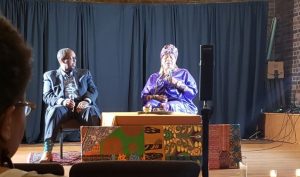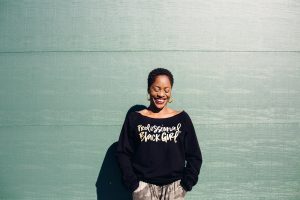 Excerpted from The Black Scholar, Vol. 47, Aug. 2017
Excerpted from The Black Scholar, Vol. 47, Aug. 2017
By Jessica Marie Johnson and Mark Anthony Neal
Black Code Studies is queer, femme, fugitive, and radical. As praxis and methodology, it waxes insurgent. It refutes conceptions of the digital that remove black diasporic people from engagement with technology, modernity, or the future. It centers black thought and cultural production across a range of digital platforms, but especially social media, where black freedom struggles intersect with black play and death in polymorphic and polyphonic intimacy.
Black Code Studies roots itself in the challenge of living in the wake of black people rendered inhuman, non-existent, and disposable by the slave ship, the plantation, the colonial state, the prison, the border. Facing devastation again and again, black folks need in and for each other becomes both time-traveling desire and reservoir knowledge. As Gumbs shows, our oracle work seeps up and through tools, structures, analog and digital architecture we were never meant to survive much less occupy.
When Cramer and Raengo declare that “black code studies emerges as a way to prepare black studies for an increasingly complex set of cultural rhythms and temporalities,” they capture the context in which this special issue appears in your hands. “Black Code” was conceived at a particular moment in the history of race—or, perhaps more apropos, Blackness—and the digital. In 2002, Alondra Nelson gathered geeks, freaks, and global nerds of color around “Afrofuturism.” Their work—and Nelson’s listserv organizing praxis—pre-dated social media platforms like Twitter, Tumblr, and Facebook. Broadband was not a “public” good yet.
Fifteen years later, protecting and imagining Black Futures is a rallying cry in the face of immediate and structural racial violence. When new platforms or syntax (i.e., hashtags) appear, as Conley shows, black feminists reappropriate them for their own use despite having been created by tech companies for capitalistic pursuits. Protecting our black digital presence is about protecting a future in which our physicality may not matter in the same way that it has in the past.
As praxis, Black Code Studies moves beyond the dyad Black + Digital, transgressive as that pairing has proven to be. It is the viral blackness that, described by Wade, “subverts social hierarchies by putting the needs and desires of Black bodies at the center.” It is the #Blktwitterstorians hashtag, created by Brown and Crutchfield to highlight black historians and history. It is blackness as a deep humanism and affect(ion) that confronts, as Driscoll shows, the biopolitics of the hexadecimal, and, as Greene-Hayes and James discuss, the biopolitics of organizing and everyday antiblackness.
Black Code Studies rejects formulations of Black Studies that tie intellectual production only to institutional structures or the digital humanities only to grant-seeking projects with university affiliations. Black thought, art, and activist work manifests in many forms. Barely scratching the surface, this special issue represents the possibilities and difficulties digital work faces within existing academic publishing models and of constraining Black Code Studies to text form. Although the work in this special issue appears in analog form, the contributors gathered here include practitioners and non-practitioners, whose projects beyond these texts we encourage you to explore, engage, and participate in. We thank you, all of you, for your work.
We conspire to abscond. We will shapeshift into being again. Soon.
 By Camille Jackson
By Camille Jackson From
From 

 By Micah English
By Micah English





 From
From 



